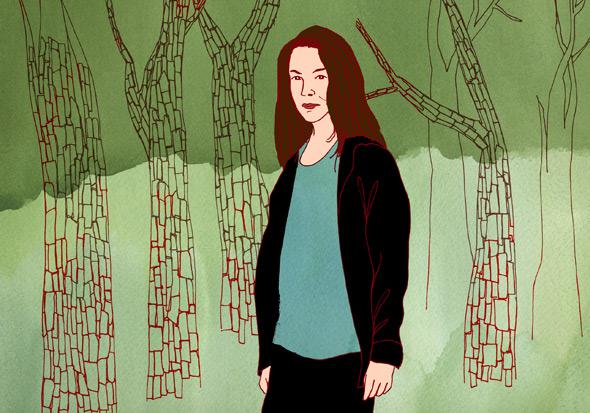Once upon a time, my friend Emily, who is from Iowa, met a woman at a party in New York. The woman asked her where she was from, and she said, “Iowa.”
“Where?” the woman asked.
“Iowa,” Emily repeated.
“Oh honey,” the woman said. “Out here we call it Ohio.”
I’ve been telling that story for years as a so-absurd-it-must-be-true sign of the East Coast’s ignorance of the center of the country. So imagine my surprise this week to discover that in fact I had stolen that anecdote almost word-for-word from a Lorrie Moore short story called “Agnes of Iowa.” Not on purpose! I really thought that the story had been told to me by an old friend. And in a way, it was: Like most people I know who love Lorrie Moore stories, I view Moore herself, though we’ve never met, as a wise, funny friend who’s much smarter about human nature than I’ll ever be.
She’s still smarter than me. But with Bark, her new collection, she’s a different, more difficult friend. For starters, she hasn’t got the time or energy for me that she used to: This slim volume of eight stories is Moore’s first collection in 16 years (though there was a novel, A Gate at the Stairs, in 2009). And while I was pining away for the Lorrie Moore of Birds of America, she was busy turning herself into someone else entirely.
Moore’s tart, punny voice is identifiable from story to story, but her subjects and her style have evolved substantially over the nearly 30 years since her first collection, Self-Help (made up mostly of stories she wrote in the MFA program at Cornell). The reader-friendly forms and transparent structure of her earlier stories has given way to denser, more adventurous storytelling. Where once her stories were light breezes—albeit ones that would occasionally blow up into gales—now they are complex weather systems: swirling, variable, dangerous, and difficult to anticipate more than 36 hours in advance.
Consider “Paper Losses,” the most brutal of the stories in Bark. If Moore had written this story in her 20s or 30s, the married couple heading for divorce, Kit and Rafe, might have presented their takes in competing narration or through a second-person instructional. We might have seen the characters share affection even as the marriage fell apart, and we might have felt, along with the characters, a kind of gentle sadness for the inevitable failure of these two humans to build a life together that could last. The story, no matter how dark, would have been threaded with bright spots: jokes, comic riffs, and, above all, memories of the deep affection Kit and Rafe shared.
Not anymore. “Paper Losses” begins with the outright declaration that Kit and Rafe want to kill each other and gets grimmer from there:
He was prickly and remote, empty with fury. A blankness had entered his blue-green eyes. They stayed wide and bright but nonfunctional—like dime-store jewelry … Occasionally he catcalled and wolf-whistled across his mute alienation, his pantomime of hate momentarily collapsed. “Hey, cutie,” he would call to her from the stairs, after not having looked her in the eye for two months. It was like being snowbound with someone’s demented uncle: should marriage be like that? She wasn’t sure …
It had been a year since Rafe had kissed her. She sort of cared and she sort of didn’t. A woman had to choose her own particular unhappiness carefully. That was the only happiness in life: to choose the best unhappiness.
Unlike in previous Moore stories, these jokes neither set the story aloft nor leaven the story’s sadness. These are grim jokes, dark as the grave, reflexive shrugs from a character who no longer sees the point. “People will do anything, anything, for a really nice laugh,” Moore wrote in one of her first stories. In Bark, people who’ve done anything, anything, now face the results.
Rafe finally serves Kit with divorce papers, but the two still take a long-planned Caribbean vacation with their children. The trip is a hash, and the last half of the story is a master class at the ratcheting up of tension. Moore doesn’t really write murder stories, the occasional corpse on a floor notwithstanding. But at times during “Paper Losses,” especially given its opening sentence, I felt certain that what I was reading was about to turn bloody and awful. It might have been a relief. Instead of a murder, though, the story dives ever so briefly into the second person, for a moment so messy that days later I can scarcely believe I read it:
Kit sank down in a large chair next to Rafe. He was tanning himself, she could see, for someone else’s lust. “I think I need a drink,” she said. The kids were swimming.
“Don’t expect me to buy you a drink,” he said.
Had she even asked? Did she now call him the bitterest name she could think of? Did she stand and turn and slap him across the face in front of several passersby? Who told you that?
* * *
Years ago, Moore told the Paris Review that she has a “writer friend” who leans over sleeping babies and intones, “May you never be reviewed by Michiko Kakutani.” Moore’s latest was reviewed by Michiko Kakutani, and the review is deeply irritating. Kakutani declares the book “disappointing” in her first sentence, then avoids reflecting at all on what it means to be disappointed by a book. And disappointment with a book is not an uncomplicated feeling! It’s one that works at multiple layers: the layer at which you loved an author’s previous work, so much so that when you laid hands on the new book you felt a little thrill that this treasure has appeared in your life. The layer at which you struggle to find in the book the things you loved before. The layer of disillusion, as you realize that something is missing: But is it missing in the book, or is it missing in you? The layer at which the flaws in this new book retroactively make you dislike previous books by the same writer. The layer of disappointment in yourself, for being so foolish as to desire a transcendent experience—for being so foolish as once to have felt that, before you became old. And finally the layer where you tell your friends, I didn’t like this one.
I sense that Kakutani was moved by previous books of Moore’s; she calls Who Will Run the Frog Hospital? “wonderful,” though, as always, she studiously avoids the personal. (“Many Moore fans,” she suggests, won’t like this one.) And when I read Bark, my initial response was similar to what I infer Kakutani’s to be: These stories failed me, at first, or I failed them, perhaps. For days I struggled with the book, dipping back in, rereading stories and talking about them with people I know who had read the book as well. Where was my disappointment coming from? What did I want out of a book, and a writer? What does a reader do when she realizes a favorite author has changed?

Photo by Zane Williams
It took me a long time to realize that was I was doing to myself was what Lorrie Moore does to her characters. In Bark, Moore sits her protagonists down and interrogates their emotions, to the point, sometimes, of unpleasantness. Her language is penetrating and discomfiting, all the more so because her subject is, in many ways, the failure of language—the inability of logorrheic modern men and women to find even in their torrent of words the right ones to address the pain roiling behind them. In “Referential,” the narrator’s institutionalized son compulsively cuts himself, and the scars resemble “coarse campfire writing, as when young people used to stiffly carve the words PEACE and FUCK in park picnic tables and trees, the C three-quarters of a square. Mutilation was a language. And vice-versa.”
The desperation Moore’s characters feel, at times, gives me the creeps. Never has a character sprung into my mind’s eye as fully formed as when I read Moore’s description of Zora, the sexy but screwed-up woman for whom the hero of the story “Debarking” falls. He asks about a reference she’s made to being on antidepressants, and she replies, “Yes, indeedy. I went on them two years ago, after my so-called ‘nervous breakdown.’ ” “And here,” Moore writes, “she put two fingers in the air, to do quotation marks, but all of her fingers inadvertently sprang up and her hands clawed the air.”
Jesus Christ! My skin is crawling just rereading that. “Aggh,” I wrote in the margin. Reading Moore can inspire a lot of involuntary marginalia, a phenomenon Moore glancingly notes in the story “Wings,” in which a character finds her mom’s marked-up old copy of The House of Mirth: “The word whoa appeared on every other page.” “Wings” is a kind of heart to the book, and like her last collection’s heart, “People Like That Are the Only People Here,” it’s a fierce little masterpiece. But the difference between them is illustrative of the knotty turns that Moore’s writing has taken. “People Like That,” the instantly iconic story—based, if The New Yorker’s use of a huge photo of Moore to accompany it is to be trusted, to some degree on truth—of a Midwestern writer and her baby’s battle with cancer, was morally complex but dramatically straightforward. There was the Baby, and the Mother, and the Father, and what we wanted was what they all wanted: for the Baby to survive.
In “Wings,” a free adaptation of Henry James’ The Wings of the Dove, failed singer KC befriends, or preys on, or falls for, or seduces, or flees to, or comforts, and in a way kills, maybe, an elderly neighbor. Moore never lets you feel at ease with KC’s motivations, or for that matter the neighbor’s. But the story is really about KC’s relationship with another man, Dench, the love of her life, who never offers money or intimacy but is an endless font of charm and wit. (“The netis will never learn a thing from me!” he declares after “waterboarding himself with a neti pot.”) He’s untrustworthy, a “walking caveat emptor,” so aimless that KC goes from worrying that he sells drugs to praying that he sells drugs. (“Where are the drugs?” she asks herself in moments of despair, an echo of “People Like That” and its final line, “Now where is the money?”) First I found Dench hilarious. Then I found him repulsive. Finally I found in him a kind of shambling, hippie embodiment of what is at once invigorating and awful in Moore’s newest stories: the dangerous intersection of the heart and the mouth:
She loved Dench. She was helpless before the whole emotional project of him. But it didn’t preclude hating him and everything around him, which included herself, the sound of her own voice—and the sound of his, which was worse.
Lorrie Moore and I used to be friends. Now I don’t think she likes me at all. But her stories, her stories, are perfect.
—
Bark by Lorrie Moore. Knopf.
See all the pieces in this month’s Slate Book Review.
Sign up for the Slate Book Review monthly newsletter.
